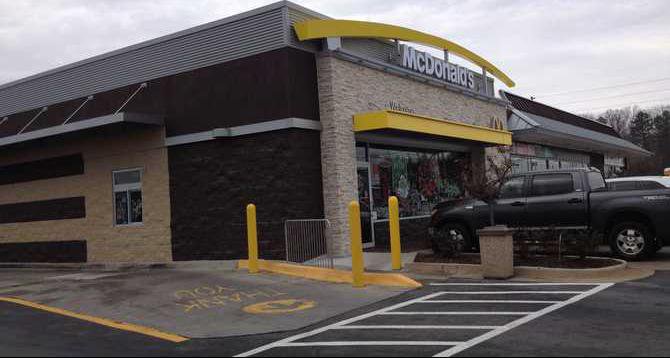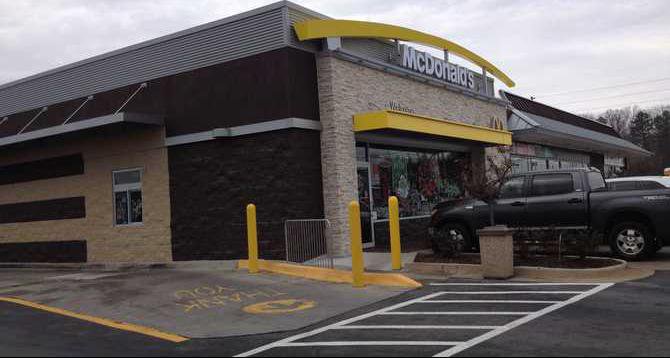A Dollar General and McDonald’s are planning to come to Newton County’s east side, and officials and residents hope the stores are a precursor to future development.
Initial steps for both stores were approved by the Newton County Board of Commissioners Tuesday.
Dollar General
The Board unanimously approved rezoning 5.9 acres of a 42.75-acre tract near the intersection of Ga. Highway 11 and U.S. Highway 278 from agricultural residential to general commercial.
The rezoning of that land, which is on Ga. 11 just north of the 278 intersection, will prepare the way for two new commercial businesses as the 5.9 acres will be further split up into two tracts of land.
A 9,100 square foot Dollar General with 30 parking spaces is planned for the smaller tract, while the conceptual plan for the second tract calls for a 12,000 square foot commercial building with 40 parking spaces in the future.
The Dollar General tract will be developed by Atlanta firm Sullivan Wickley, while the Stanton family will retain control of the second tract.
Jason Fritz, Sullivan Wickley’s vice president of development and brokerage, said the Dollar General will be built to look like the historic Brick Store building itself with four-sided brick walls, false shutters and a peaked parapet design.
In a letter to the county, Fritz said the store would bring 10 full-time jobs, as well as more convenient access to grocery, retail and household items.
“Dollar General is not a ‘dollar store’ or a ‘99-cent store.’ In fact, fewer than 25 percent of the merchandise sold by Dollar General costs a dollar or less. Dollar General is a neighborhood general store that serves the nearby community,” Fritz said.
The store will meet the increased design requirements coming with the Brick Store zoning overlay being developed for that area, which is going to require higher-quality commercial and residential development. For example, the Dollar General will have a monument-style ground sign, instead of a sign on a pole like on many commercial corridors, and the sign on the building will be made of individual letters. The signs will not be internally lit, but will have exterior lighting, which is softer.
District 1 Commissioner John Douglas thanked the developer and land owners for agreeing to the high development standards and said he hoped it would be a precursor for more quality development.
McDonald’s
The developer wanting to build a McDonald’s on Ga. 11 near Interstate 20 also reached an agreement, which the Board of Commissioners approved Tuesday, that will move that project forward.
Under the agreement, the property’s developer, Kevin Price, will purchase an adjacent piece of property and combine the two into a single parcel so he can meet the county’s ordinances that don’t allow commercial properties to have more than 50 percent of their land as impervious surfaces – surfaces, usually paved, that don’t allow water to pass through and create water runoff.
Price will have 18 months to acquire the additional property, which will allow him to move forward with redeveloping the 1.5-acre property at 387 Ga. 11 to accommodate a new McDonald’s and fill up a vacant store spot that used to house a BP gas station.
County Attorney Tommy Craig, who negotiated the agreement, said the plan calls for the existing convenience store to be demolished and a McDonald’s and new convenience store to be built, similar to the high-quality masonry exterior of McDonald’s at the Almon Road, I-20 exit.
Initially, Price had asked for a variance to the county’s impervious surface ordinance.
The county’s Board of Zoning Appeals previously voted 3-2 to approve Price’s request to have 64.3 percent of the property be impervious surfaces; under that plan, Price had agreed to install a water system to catch any contaminants that came off the site.
However, local resident Troy Bledsoe, who also serves on the county’s planning commission, appealed the zoning board’s decision, saying granting the variance could set a precedent that would weaken the effectiveness of the county’s strict watershed protection laws.
The Board of Commissioners tabled the issue, with Commissioner John Douglas saying he wanted to see that 64.3 percent impervious surface number reduced as much as it could be.
Both Price and Bledsoe signed off on the agreement, which calls for Bledsoe to withdraw his appeal if enough land is purchased to meet the county’s ordinance.





